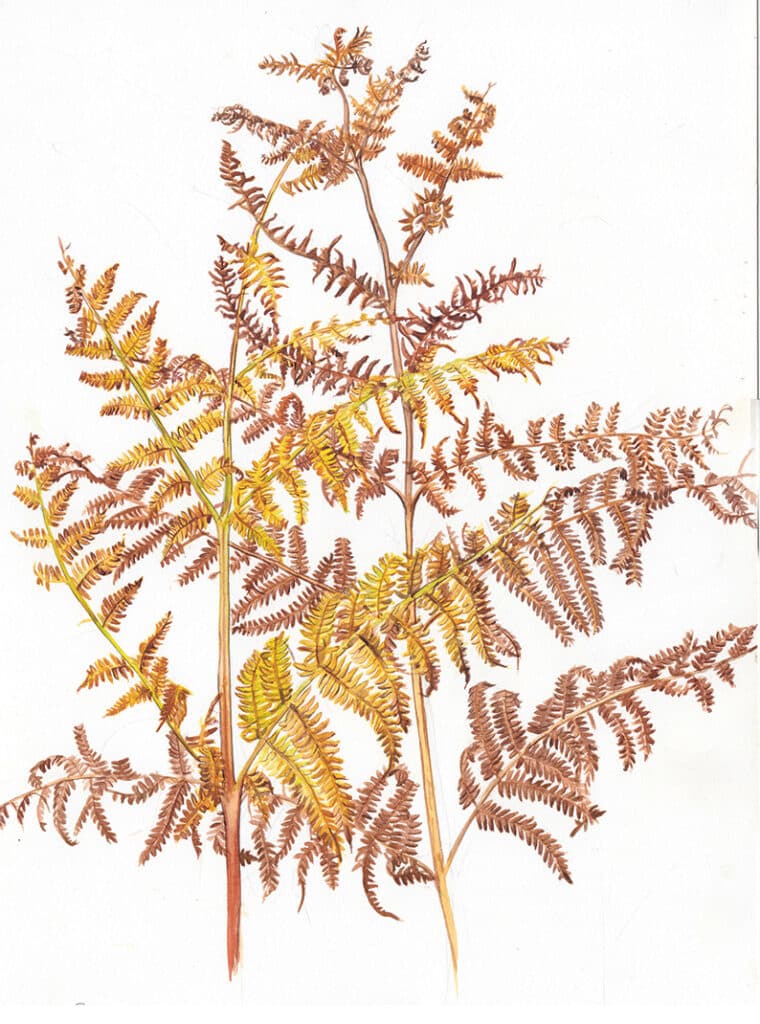Ferns depict the seasons in such a visually prominent way. The way they uncurl in the spring has such an air of drama about it, and when they have stopped uncurling and have reached full height, we know summer is really here, and then from late summer we get the beautiful rust of the bracken dying back down for the winter. For 2023, The Kilcoe Studios Calendar has watercolour illustrations of native Irish ferns and it also delves into our cultural use of ferns in times past, as Sonia Caldwell explains.

Many people can identify bracken, our most abundant fern. Like most plants that were abundant in the past people found uses for them. It was used for thatching, food, fuel, medicine, manufacture of glass, bedding, a source of potash, making soap, bleaching and dyeing. In 1917 one ton of bracken ash could be sold for £17 (British pounds).
Bracken leaves contain a carcinogenic compound, ptaquiloside, which breaks down when it is composted and seems also to break down in other ways when prepared by some societies for eating.
In general, most ferns are not considered edible, but those with a serious interest in foraging for food may be surprised that a few are, once they are prepared properly.
At one point in history, before botany and microscopes helped our understanding of the lifecycle of plants, ferns were not really understood. People could not quite understand how they could reproduce without seed, so they had a somewhat mythical status.
Some Irish stories refer to a fairy changeling. If this changeling was banished into a river or lake, it would turn into a clump of fern or yellow Iris. The fern also appears in the ‘Cattle Raid of Cooley’ – The warrior Nera enters a fairy mound at Samhain and he returns from the mound carrying golden fern, wild garlic and primroses.
In the 19th Century, ferns were subject to over-collecting during the ‘fern craze’. Before the 1830s there was no obvious interest in ferns other than essential use for common ferns like Bracken or the odd fern with medicinal value. The Victorian era saw a surge in interest in collecting, studying and other artistic pursuits among the middle classes, mostly in Britain but of course this all came to Ireland.
Also around this time Killarney had become a popular tourist destination and ferns were part of the Killarney experience, especially the Killarney fern, which was collected until it was nearly extinct. To this day any patches of it are guarded secretly and protected. The Killarney fern painted in this Calendar was painted from a specimen in the Botanic Gardens in Glasnevin.
Other ferns that feature are Maiden Hair fern, which was also over-picked for tourism, the male and female fern {which along with the Buckler fern are very tricky to identify}, the Hard Fern, Harte’s tongue, Royal Fern and Maiden Hair Spleenwort. There is information accompanying each image.
The Calendar is also highly practical with good matt paper for writing on and a full A4 page for each month to write in everything.
Workshops and events in December
Suitable for adults and children over 13 – unless stated otherwise.
Saturday, November 26: Foraging for, and making Christmas wreaths from local materials from the hedgerows with Sonia Caldwell, 3pm-5.30pm, €35.
Sunday November 27: Shop open all day during the Ballydehob Craft Fair. Drop-in craft for children – gnomes and stars, 12pm-4pm. Donations.
December 3: Willow Stars – make your own Christmas decorations with Rosemary Kavanagh, 11am-1pm, €40. Bullrush Angels – 2.30pm-4pm, €35. Book both workshops for €70.
Sunday, December 4: Straw craft for Christmas – Stars and Spiral straw craft with Sonia Caldwell, 2.30pm-5pm, €35.
Thursday, December 8: Talk/discussion about the Wren traditions in Cork and beyond and demonstration on making a straw boy hat. Please come and learn and share your old memories and stories and also to discuss the practice of the Wren in Cork today and especially Ballydehob. 7pm-8.30pm. Free.
Early 2023 events: Textiles, Sewing and Willow growing with craft experts. More details next month.
Please email events@kilcoestudios.com to get more information and to book a place or call 087 0667871.

